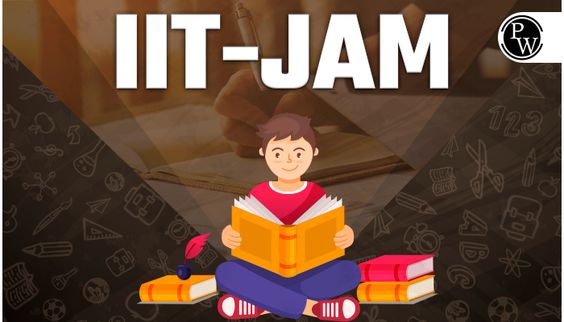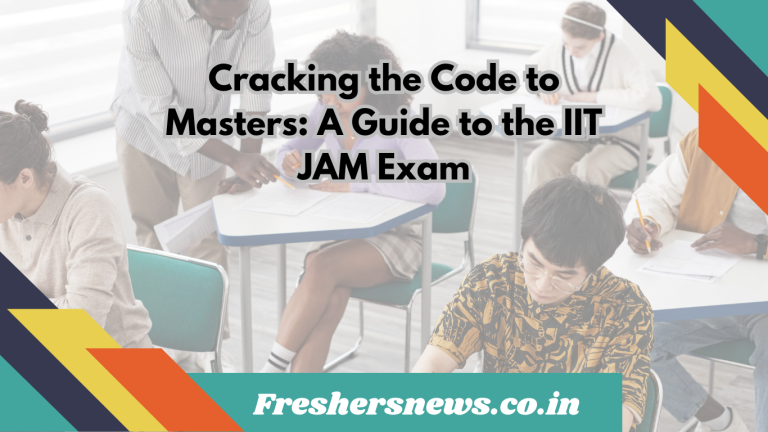Introduction
Now, you have set your aim to pursue post-graduation from a top institute. Ok then, you must plan to qualify for the Joint Admission Test for the Masters (IIT JAM) exam, and it will be the gateway to your dream college. This blog will equip you with all the essential information to navigate the JAM confidently. We are discussing Cracking the Code to Masters: A Guide to the IIT JAM Exam.

Let’s dive into Cracking the Code to Masters: A Guide to the IIT JAM Exam:
This exam will assess your knowledge in these 7 subjects:
- Biotechnology (BT)
- Chemistry (CY)
- Economics (EN)
- Geology (GG)
- Mathematical Statistics (MS)
- Mathematics (MA)
- Physics (PH)
Eligibility criteria
- Must hold a bachelor’s degree in any of the relevant science disciplines.
Exam pattern
3 types of questions will be asked:
- MCQs that carry one mark each and have four answer choices.
- MSQs carry two marks each and require choosing two or more correct answers from various options.
- Numerical Answer Type (NAT) questions carry one mark each and demand precise numerical answers, typically entered using an on-screen calculator.
Important dates
- Application start date: October 13, 2023
- Application deadline: October 20, 2023
- Exam date: February 11, 2024
- Result declaration: March 22, 2024
How to prepare for IIT Jam
- Understand the syllabus and examination pattern.
It is essential to have a clear concept regarding “what to study.” & “How it will be asked?”
- Create a study plan.
Once you have the perfect materials, you must create a study plan. This will assist you in remaining on track and making sure that you cover all of the crucial topics. Your study layout has to be realistic and achievable, and it is necessary to plan practical time for every analysis of a new topic and revise what you have already learned.
- Self-Study or Coaching:
The most common questions in students’ minds are how to prepare for the JAM exam and whether to take coaching. The best decision will be a combination of both. Now, JAM is not something you have included in your school curriculum. Therefore, coaching will guide your preparation by providing relevant study materials and tests. Then, you can solve exercises and review materials to study independently.
- Work on fundamentals:
Developing fundamental concepts should be prioritized before moving on to JAM exam-level questions. So, focus on studying basic concepts and practice easy questions first. Then, gradually move on to higher-level questions.
- Practice lots of questions:
After completing a topic, practice asking as many questions as possible. Move from lower to higher-difficulty questions. Reviewing the concepts a few times through practice can help you prepare for the JAM exam.
- Analysis of test
A practice test is a simulation of the real test. So, as the exam approaches, taking practice tests regularly should be a part of your JAM preparation strategy. Additionally, it is equally important to analyze your simulations and identify your weaknesses.
- Practice regularly
One of the best approaches to put together for the JAM examination is to practice answering questions regularly. You can do this by solving exercise papers and taking mock tests. There are many special exercise papers and mock tests available on the Internet and also in books.
- Stay motivated.
It is essential to be stable, active, and motivated throughout your preparation.
- Focus on your weak areas.
As you start answering questions, you will perceive your weak areas. Once you know your weak areas, you can focus your research on these topics. You will additionally need to get additional exercise material for these topics.
About the syllabus of the IIT JAM exam
- Biotechnology
Cell biology, biochemistry, genetics, molecular biology, microbiology, instrumentation techniques, and bioprocess engineering.
- Chemistry
Inorganic, organic, physical, and analytical chemistry with additional emphasis on spectroscopy and nanochemistry.
- Economics
Microeconomics, macroeconomics, econometrics, and statistics are central to this syllabus, with an additional focus on development and mathematical economics.
- Geology
Physical geology, mineralogy, petrology, paleontology, stratigraphy, and economic geology, with insights into geochemistry and geophysics.
- Mathematical Statistics
Probability theory, statistical inference, regression analysis, time series analysis, multivariate analysis, mathematical foundations, and computational methods.
- Mathematics
Algebra, calculus, real analysis, complex analysis, differential equations, and linear algebra, with additional emphasis on topology, discrete mathematics, and numerical analysis.
- Physics
Mechanics, electromagnetism, optics, thermodynamics, quantum mechanics, and statistical mechanics, with additional focus on nuclear, solid-state, and particle physics.
Which books should I prefer for the IIT JAM exam?
- Biotechnology
- “Arihant’s IIT JAM Biotechnology Solved Papers and Practice Sets”
- “Biotechnology by U Satyanarayana”
- Chemistry
- “Arihant’s IIT JAM Chemistry Solved Papers and Practice Sets”
- “Organic Chemistry by OP Agarwal”
- “Inorganic Chemistry by J.D. Lee”
- “Physical Chemistry by OP Agarwal”
- Economics
- “Arihant’s IIT JAM Economics Solved Papers and Practice Sets”
- “Microeconomics by Robert S. Pindyck and Daniel L. Rubinfeld”
- “Macroeconomics by Olivier Blanchard”
- Geology
- “Arihant’s IIT JAM Geology Solved Papers and Practice Sets”
- “Textbook of Geology by AG Luond”
- “Principles of Igneous and Metamorphic Petrology by AG Luond”
- Mathematical Statistics
- “Arihant’s IIT JAM Mathematical Statistics Solved Papers and Practice Sets”
- “Introduction to Probability and Mathematical Statistics by V.K. Rohatgi”
- “Miller & Freund’s Probability and Mathematical Statistics”
- Mathematics
- “Arihant’s IIT JAM Mathematics Solved Papers and Practice Sets”
- “Advanced Engineering Mathematics by Erwin Kreyszig”
- “Mathematical Methods for Physics and Engineering by Riley, Hobson, and Bence”
- Physics
- “Arihant’s IIT JAM Physics Solved Papers and Practice Sets”
- “Concepts of Physics by HC Verma”
- “Feynman Lectures on Physics by Richard Feynman, Robert Leighton, and Matthew Sands”
Common mistakes to avoid in IIT Jam
- Not analyzing the examination pattern, questions, and syllabus: it is important to clearly understand the study program and which topics to focus on.
- Not managing time effectively: Time management is essential in any competitive exam.
- Not practicing regularly: One of the excellent methods to put together for the JAM examination is to practice answering questions regularly.
- Making common mistakes: In any competitive exam, it is crucial to concentrate and keep away from making careless mistakes.
- Not focusing on weak areas: As you practice answering questions, you will become aware of your weak areas
FAQs
Can I apply for the IIT JAM exam after completing my Master’s degree?
Yes, you can, as there is no restriction on the number of times you can attempt this exam.
Mention some scholarship options available for IIT JAM students.
2 of them include:-
- National Science Scholarship (NSS),
- the Rajiv Gandhi Science Scholarship (RGSS),
Define the differences between on-campus & off-campus programs in postgraduate science studies.
On-campus programs typically offer a more immersive academic experience with access to:-
- state-of-the-art laboratories,
- infrastructure,
- faculty research projects.
Off-campus programs offered through satellite campuses or collaborations with other institutions can provide greater flexibility and convenience while maintaining quality education.
Mention some unique skills or qualities to help you excel in the IIT JAM preparations.
- Strong analytical skills,
- critical thinking abilities,
- passion for research
- continuous learning,
- excellent time management.
Mention the career prospects after clearing the IIT JAM Exam.
- Research and development in various scientific fields,
- teaching at universities and colleges,
- working in government agencies or private companies related to your chosen subject,
- pursuing further doctoral studies.
Conclusion
Conquering the IIT JAM examination demands unwavering dedication, strategic planning, and a deep understanding of each topic of the examination. This blog has served as your guide, supplying insights into the syllabus, preparation tips, useful resource recommendations, and common mistakes to avoid.
Remember, success is no longer in a single day; it includes consistency, enjoying small wins, and continuing to be promoted throughout the journey. Utilize available resources, prioritize your health, and consider your potential to ace the exam. Whether you aspire to secure your seat in a prestigious institute, the understanding from this preparation will pave the way.
Embrace the challenge and consider that the key to unlocking your dream lies inside your unwavering focus and dedication. So, step into your preparation with self-belief and overcome the IIT JAM with your work and determination!



